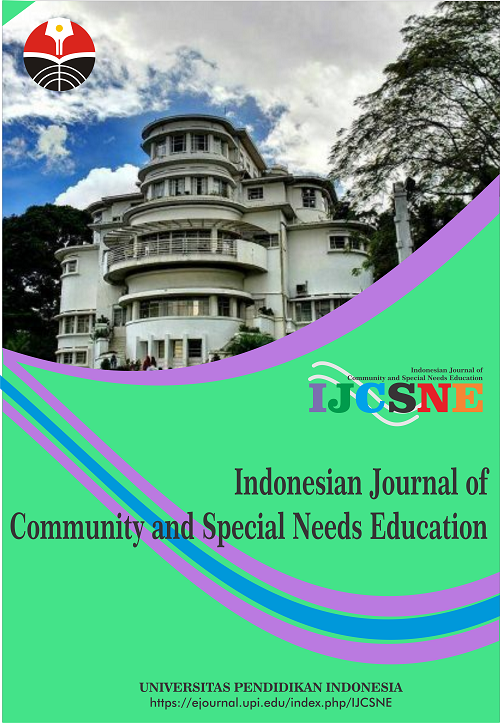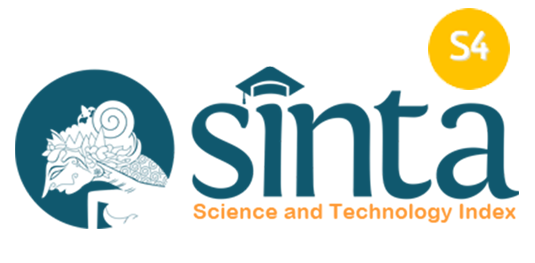The Role of Peer Support on Social Interaction of Hearing and Hearing Impairment Students in Buleleng Inclusive School
Abstract
Keywords
Full Text:
PDFReferences
Shalaby, R. A. H., and Agyapong, V. I. (2020). Peer support in mental health: literature review. JMIR Mental Health, 7(6), e15572.
Akbarovna, A. (2022). Inclusive education and its essence. International Journal of Social Sciences and Interdisciplinary Research, 11(1) 248-254.
Batten, G., Oakes, P. M., and Alexander, T. (2014). Factors associated with social interactions between deaf children and their hearing peers: A systematic literature review. Journal of Deaf Studies and Deaf Education, 19(3), 285–302.
Bell, C., Bierstedt, L., Hu, T. (Amber), Ogren, M., Reider, L. B., and LoBue, V. (2024). Learning through language: The importance of emotion and mental state language for children’s social and emotional learning. Social and Emotional Learning: Research, Practice, and Policy, 4, 100061.
Bierman, K. L., and Sanders, M. T. (2021). Teaching explicit social-emotional skills with contextual supports for students with intensive intervention needs. Journal of Emotional and Behavioral Disorders, 29(1), 14–23.
Braun, V., and Clarke, V. (2006). Using thematic analysis in psychology. Qualitative Research in Psychology, 3(2), 77–101.
Charles, J., Bali, T., and Sungwa, R. (2024). Enhancing engagement of hearing-impaired pupils in inclusive Tanzanian classrooms through teaching and learning materials. DIB Journal, 27(1), 247-264.
Chetverikova, T. Y., Kuzmina, O. S., and Sinevich, O. Y. (2020). Technology of social and emotional learning as a tool for preparing students for inclusive education. SHS Web of Conferences, 87, 00069.
Daunic, A. P., Corbett, N. L., Smith, S. W., Algina, J., Poling, D., Worth, M., Boss, D., Crews, E., and Vezzoli, J. (2021). Efficacy of the social-emotional learning foundations curriculum for kindergarten and first-grade students at risk for emotional and behavioral disorders. Journal of School Psychology, 86, 78–99.
Dede, C., Okoyeukwu, N., and Nwankwor, P. (2024). Improving reading comprehension of pupils with hearing impairment through peer tutoring. Journal of Pharmaceutical Negative Results, 14(3), 484–490.
Dimitrellou, E., and Hurry, J. (2019). School belonging among young adolescents with SEMH and MLD: The link with their social relations and school inclusivity. European Journal of Special Needs Education, 34(3), 312–326.
Duncan, A., Risley, S., Combs, A., Lacey, H. M., Hamik, E., Fershtman, C., Kneeskern, E., Patel, M., Crosby, L., Hood, A. M., Zoromski, A. K., and Tamm, L. (2023). School challenges and services related to executive functioning for fully included middle schoolers with autism. Focus on Autism and Other Developmental Disabilities, 38(2), 90–100.
Eilertsen, L. J., Hjulstad, O., Prochnow, R. R., and Slettner, S. (2024). Collaborative, responsive behavior in peer interaction: Children with and without Down syndrome and hearing impairment. Journal of Interactional Research in Communication Disorders, 15(2), 1–27.
Ellis, L. A., Marsh, H. W., and Craven, R. G. (2009). Addressing the challenges faced by early adolescents: A mixed-method evaluation of the benefits of peer support. American Journal of Community Psychology, 44(1–2), 54–75.
Ferreira, M., Martinsone, B., and Talić, S. (2020). Promoting sustainable social emotional learning at school through relationship-centered learning environment, teaching methods and formative assessment. Journal of Teacher Education for Sustainability, 22(1), 21–36.
Hassani, S., and Schwab, S. (2021). Social-emotional learning interventions for students with special educational needs: A systematic literature review. Frontiers in Education, 6, p.808566.
Horoz, N., Buil, J. M., Koot, S., van Lenthe, F. J., Houweling, T. A. J., Koot, H. M., and van Lier, P. A. C. (2022). Children’s behavioral and emotional problems and peer relationships across elementary school: Associations with individual- and school-level parental education. Journal of School Psychology, 93, 119–137.
Khongsankham, W., Pianthaisong, Y., Meedindam, R., Niyomves, B., and Jedaman, P. (2024). Fostering emotional intelligence and social competence: A comprehensive review of social-emotional learning in education. Journal of Education and Learning Reviews, 1(1), 17–28.
Kiblen, J. C., Shogren, K. A., Scott, L. R., Kan, D., Bossen, B., and Hume, K. (2024). Perspectives of autistic students and their teachers on self-determination and peer support. Research in Autism Spectrum Disorders, 117, 102438.
Llorent, V. J., Núñez-Flores, M., and Kaakinen, M. (2024). Inclusive education by teachers to the development of the social and emotional competencies of their students in secondary education. Learning and Instruction, 91, 101892.
Made, N., Antari, R., Santosa, H., and Dang, T. T. (2024). Ramification of social-emotional learning on students’ academic success in English: A systematic literature review. English Learning Innovation, 5(2), 316–326.
McDermid, C. (2020). Educational interpreters, deaf students and inclusive education? Turkish Journal of Special Education, 1(2019-V1-I1), 27–46.
Meyers, D. C., Domitrovich, C. E., Dissi, R., Trejo, J., and Greenberg, M. T. (2019). Supporting systemic social and emotional learning with a schoolwide implementation model. Evaluation and Program Planning, 73, 53–61.
Morningstar, C. L. (2020). Student perspectives on peer mentoring in an inclusive postsecondary education context. Journal of Inclusive Postsecondary Education, 2(1), 1-21.
Nurmalita, T., Yoenanto, N. H., and Nurdibyanandaru, D. (2021). The effect of subjective well-being, peer support, and self-efficacy on student engagement. ANIMA Indonesian Psychological Journal, 36(1), 36-68.
Putu, N., Wedayanti, L., Widya Purnawati, K., and Artawa, K. (2024). Place naming strategy in Kata Kolok sign language. The International Journal of Social Sciences World, 6(1), 162–169.
Sahara, B., Mumpuniarti, M., Suwarjo, S., and Syamsuri, M. (2024). Perspectives of peers as a microsystem for supporting deaf students in inclusive elementary schools. International Journal of Learning, Teaching and Educational Research, 23(4), 298–319.
Silvestri, J. A., and Hartman, M. C. (2022). Inclusion and deaf and hard of hearing students: Finding asylum in the LRE. Education Sciences, 12(11), 773.
Singleton, J. L., and Crume, P. K. (2022). The socialization of modality capital in sign language ecologies: A classroom example. Frontiers in Psychology, 13, 934649.
Spörer, N., Lenkeit, J., Bosse, S., Hartmann, A., Ehlert, A., and Knigge, M. (2020). Students’ perspective on inclusion: Relations of attitudes towards inclusive education and self-perceptions of peer relations. International Journal of Educational Research, 103, 101641.
Stark, K., Koslouski, J. B., Vadhan, J., and Vega, M. (2024). The future is inclusive: An invitation for interdisciplinary collaboration between social emotional learning and special education researchers. Social and Emotional Learning: Research, Practice, and Policy, 3, 100043.
Susilawati, S. Y., bin Mohd Yasin, M. H., and Tahar, M. M. (2023). Influencing factors of inclusive education for students with hearing impairment. Pegem Egitim ve Ogretim Dergisi, 13(2), 119–125.
Szumski, G., Smogorzewska, J., and Grygiel, P. (2020). Attitudes of students toward people with disabilities, moral identity and inclusive education—A two-level analysis. Research in Developmental Disabilities, 102, 103685.
Ubah, J. C., Egbe, C. I., Ugwuanyi, L. T., Uzoamaka, A. J., Dike, A. A., Nnamani, O., Chukwuma, I. S., Otu, M. S., Adaka, T. A., Nnamani, A. P., Nwankwor, P. P., Ogele, U. I., Okoyeukwu, N. G., Ukoha, E. O., and Uloh-Bethels, A. C. (2022). Effect of peer tutoring on social adjustment among English learners with hearing impairments in special primary schools. Medicine, 101(14), e28907.
Wang, Y. C., Tai, Y. M., Wu, Y. Y., Chiu, Y. N., Tsai, W. C., and Gau, S. S. F. (2024). A follow-up study of peer relationships in autistic and non-autistic youths: Mediating effects from autistic, emotional and behavioral symptoms. Research in Developmental Disabilities, 151, 104768.
Wijiastuti, A., Masitoh, S., Kurrotun Ainin, I., and Ardianingsih, F. (2020). Critical analysis of the inclusive education implementation in the concept of freedom of the soul and zona proximal development. Jurnal Pendidikan Inklusi, 3(2), 62–71.
Williams, C. J., Chen, J. M., Quirion, A., and Hoeft, F. (2024). Peer mentoring for students with learning disabilities: The importance of shared experience on students’ social and emotional development. Frontiers in Education, 9, 1292717.
Woodcock, S., Sharma, U., Subban, P., and Hitches, E. (2022). Teacher self-efficacy and inclusive education practices: Rethinking teachers’ engagement with inclusive practices. Teaching and Teacher Education, 117, 103802.
Wulan, R., Sanjaya, W., and Raya, P. (2022). Developing positive school climate for inclusive education. Journal of Education for Sustainability and Diversity, 1(1), 54-66.
Yang, L., Pang, F., and Sin, K. F. (2024). Examining the complex connections between teacher attitudes, intentions, behaviors, and competencies of SEN students in inclusive education. Teaching and Teacher Education, 144, 104595.
Yousif, N. B. A., Yousef, E. M., and Abdelrahman, R. M. (2021). The social and psychological effects of inclusive education of persons with hearing disability in society: A field study at the disability resource centre (Sharjah University). Sustainability, 13(22), 12823.
DOI: https://doi.org/10.17509/ijcsne.v6i1.90875
Refbacks
- There are currently no refbacks.
Copyright (c) 2025 Universitas Pendidikan Indonesia

This work is licensed under a Creative Commons Attribution-ShareAlike 4.0 International License.















